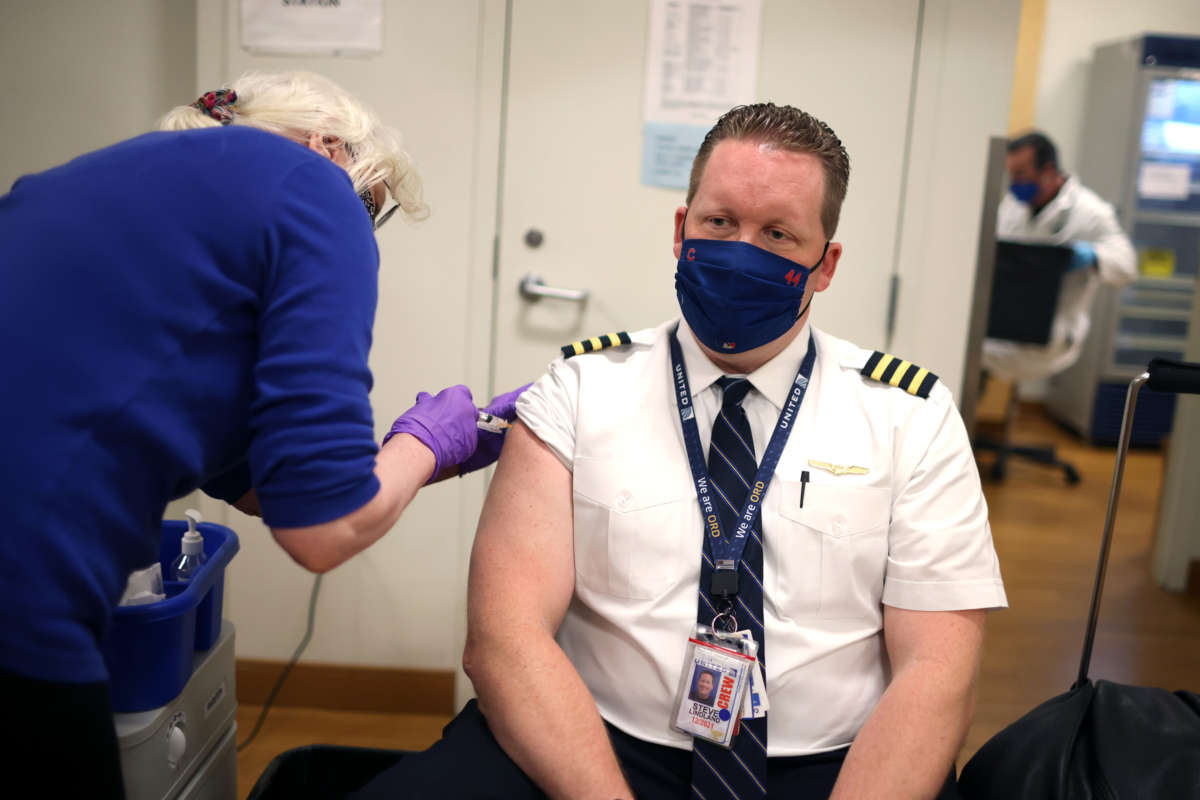Support justice-driven, accurate and transparent news — make a quick donation to Truthout today!
On Thursday, United Airlines CEO Scott Kirby said that after the company announced an employee vaccine requirement allowing few exemptions, only a “a handful” of people have quit — out of over 84,000 employees.
Speaking on CNN of the company’s September 27 vaccination deadline, Kirby said that the resignations he knows of make up an exceedingly small portion of their workforce. “The [resignations] I’m aware of are in single digit numbers,” he said.
Kirby acknowledged that the company will likely see more resignations by the deadline, but that there will ultimately be a very low number. United Airlines implemented their vaccine mandate in early August, giving their employees until the end of October to be fully vaccinated, present a medical or religious exemption, or potentially face termination. That deadline was bumped up to this month after the Pfizer vaccine was given full approval by the Food and Drug Administration (FDA) in late August.
The low number of resignations lends credence to the idea that vaccine mandates are effective at ensuring that large swaths of people are inoculated against COVID-19.
The company announced this week that 90 percent of its workforce is vaccinated — and, of the remaining 10 percent, many have simply yet to upload their proof of vaccination. The company is also seeking to relocate unvaccinated customer-facing employees to less public jobs, or place those employees on unpaid leave, Kirby added.
Labor unions are split on vaccine mandates and occupational punishments that come with them; some unions like the American Federation of Teachers have encouraged their workers to get vaccinated, but are hesitant to support mandates that could cost workers their jobs. Public health experts say that mandates like the one that President Joe Biden handed down recently are necessary if the country is looking to end the pandemic.
A recent survey suggested that a vast majority of remaining unvaccinated people — currently about 24 percent of adults in the U.S. — would rather quit than get their shots, if they aren’t able to obtain an exemption. But the survey also posed a completely hypothetical question which, as The Washington Post noted, could plausibly have skewed the results.
The question “invites people to claim an attractive, principled stand that, in many cases, might not ultimately hold up. Most of the remaining unvaccinated have staked out this position and firmly declined to get vaccinated for the better part of a year,” wrote The Washington Post’s Aaron Blake. “If they’re suddenly asked whether they would submit to doing something they didn’t previously want to do, of course many of them are going to say they would fight it.”
In reality, the risk of losing one’s job in a time of great economic uncertainty may outweigh the supposed reward of avoiding the shot, especially when an increasing number of employers and even recreational services like bars and concert organizers are mandating COVID vaccination.
Moreover, data gathered over the past months has shown that, despite breakthrough cases, the vast majority of people who are dying and being hospitalized due to COVID are unvaccinated, meaning that getting vaccinated — for most, a relatively unobtrusive process — could prevent one’s own death.
More forceful messaging on vaccines from employers and the government also appears to be changing people’s minds about whether or not to get the shot. Recent polling from Axios/Ispos found that vaccine hesitancy is slowly dropping, with fewer adults than ever claiming that they won’t get vaccinated. Forty-three percent of the people now say that they would get the shot if their employers mandated vaccinations, versus only 33 percent saying the same last month.
Press freedom is under attack
As Trump cracks down on political speech, independent media is increasingly necessary.
Truthout produces reporting you won’t see in the mainstream: journalism from the frontlines of global conflict, interviews with grassroots movement leaders, high-quality legal analysis and more.
Our work is possible thanks to reader support. Help Truthout catalyze change and social justice — make a tax-deductible monthly or one-time donation today.
